Which Type of Agricultural Grant is Best For You? (and practical advice for getting it)
Farmers know better than anyone that money doesn’t grow on trees.
In fact, economic strife and crippling debt are considered some of the biggest obstacles standing in the way of individual farmers making a successful living.
It’s a shame - because, without farmers, the world is in a massive heap of trouble. And though there are a lot of farmers with great ideas and practices, many don’t have the funds to make them a reality.
If you fall into that category, we understand.
That’s why the team at The Mobile Chicken House put together this article on agricultural grants.
We’re going to learn about private, public, and research grants. We’ll dive into all the details so you can find funding that helps you create the farm of your dreams.
Ready to go? Let’s get started!
The Basics of Agricultural Grants
Agricultural grants are a big subject--so let’s form a solid foundation to work from before getting lost in the details.
What Is An Agricultural Grant?
Grants for farmers are simple:
A lending institution agrees to give a farmer a certain amount of money to help get their farm started, or to help them out with a particular project.
Different grants can be used for various purposes. For example, some grants are not used to start your farm but may be used for projects involving research and education.
Other grants exist to help farmers who want to begin adding value to their production. For example, converting your apples into applesauce is adding value to your product.
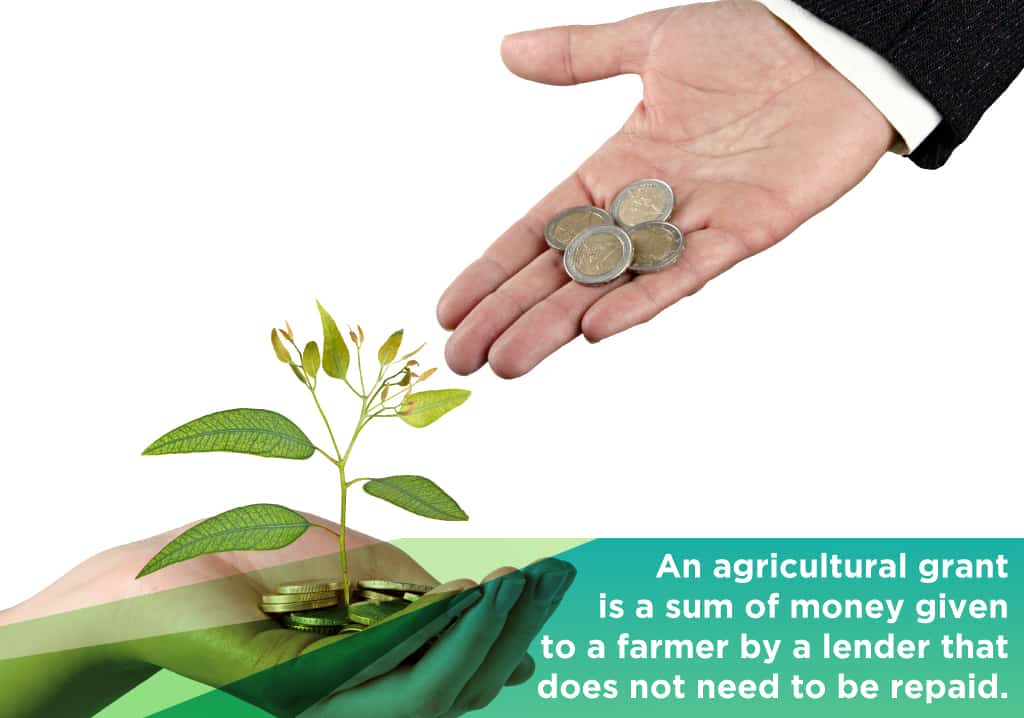
Now, we can guess the question that is probably on your mind:
“That sounds great--but can I get an agricultural grant?”
The answer is yes! If you know where to look and how to apply, there are grant applications available to most farmers.
However, you should know that grants are often very competitive. In other words, many people apply for grants, so being chosen to receive the grant is not an easy feat.
The key is finding the right grant, and then putting together a superb application.
Grants vs. Loans
In this discussion, it is vital that we differentiate between grants and loans.
A grant is a sum of money given for a particular purpose that does not need to be repaid. Grants are essentially a gift.
However, it should be noted that there is usually a certain set of criteria you must meet in order to get a grant.
For example, you may need to be a non-profit, or agree to do a particular type of research for the lender. In this sense, a grant is not simply a gift of money for you to do whatever you wish!
And remember - a grant is a legal contract. That means that if you agree to do something particular with the money granted to you, you must follow through with that action.

A loan, on the other hand, is money that you do need to repay eventually. Beyond that, most loans include interest payments and require that the loan be repaid within a certain period of time.
Agricultural loans are usually given to farmers or ranchers by a traditional financial institution like a bank. There are also government agencies like Farm Service Agency (FSA) that offer loans to farmers and ranchers that can’t get loans from their banks.
As you might guess, receiving a grant is far more favorable than getting a loan.
So what’s keeping anyone from getting a farming grant?
While there are plenty of grants available for farmers, the competition is high, and they are difficult to obtain. That’s why it’s so important to know how to apply for a grant! (We will go over more on that later).
Why Do Government Agencies and Others Offer Grants?
Why would the government, or a private organization give your farm money?
There are two main reasons:
- It meets a public interest
- It achieves a public good.
In the recent past, federal and state governments, as well as private organizations have begun to look carefully at opportunities to promote agriculture.
Why is this?
Because agriculture directly affects the people and the environment of a specific area. For example:
- Addressing run-off from farms can improve water quality
- Using renewable energy on farms affects the electric grid
- Growing farms create job opportunities
- Improved crop production creates healthier food and stable economies
As you can see, grants that are given to farmers also directly affect the good of people living in that area, and even the lender. It’s a win-win!
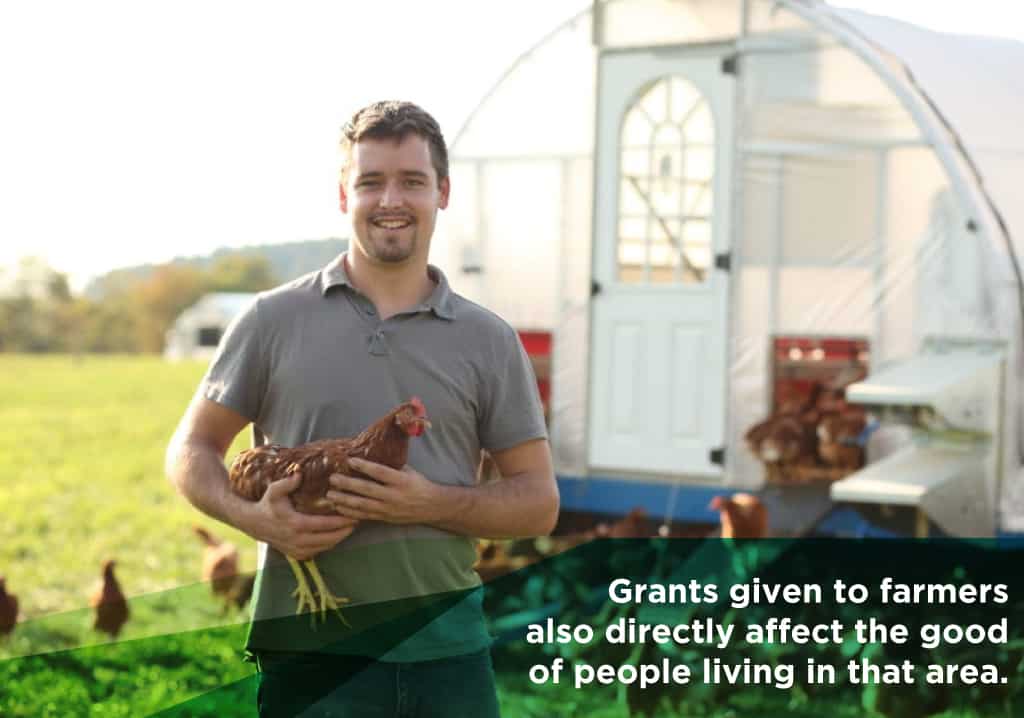
Main Types of Agricultural Grants
If you are a farmer hoping to get a grant, knowing where to start is baffling. In fact, applying for, and receiving a grant can be complicated enough that some people hire a grant writer.
However, even that is going a few too many steps down the pathway.
Before you ever start writing your grant you need to know which kind of grant you want to apply for.
There are many different types of grants - many of them industry-specific. For example, in law enforcement, there are four main types of grants: competitive funding, formula funding, continuation funding, and pass-through funding.
In this article, we will cover three overarching types of grants that apply to those in agriculture. The three main types of grants for farmers are:
- Private Grants
- Public Grants
- Research Grants
Let’s take a look at each of them so you have a clear path forward in pursuing the right type of grant!
Private Agricultural Grants
One type of grant you could pursue is a private grant. Here’s what a private grant is and how you might be able to get one.
What Is A Private Agricultural Grant?
In broad terms, a private grant is any grant that comes from an entity that is not tax supported
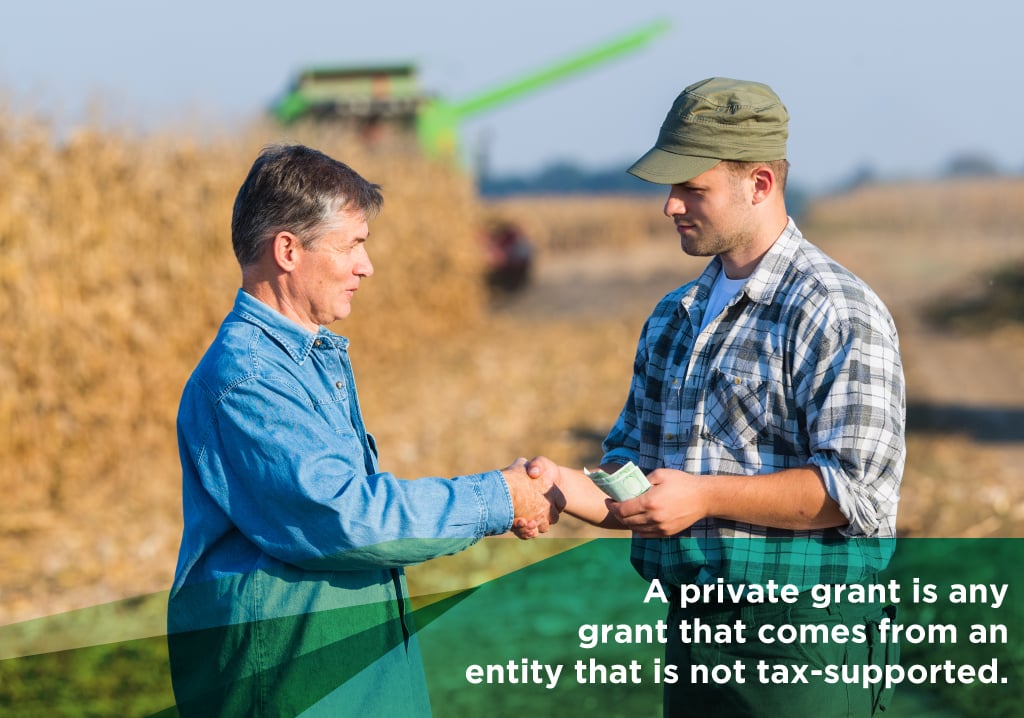
And who might offer a private agricultural grant?
There are a lot of organizations that are not tax supported, but many of them do not offer grants to farmers.
Let’s find out who does, and who doesn’t.
Which Private Organizations Give Grants To Farmers?
Generally, those who offer private grants can be split into two major categories:
1 - Private Foundations
A private foundation is a non-governmental, nonprofit organization or charitable trust. Its principal fund usually comes from a single source, such as an individual, family, or corporation. The fund is managed by the foundation's own trustees or directors.
More often than not, private foundations use their money to make grants to other nonprofit organizations.
In fact, to qualify for and maintain their U.S. tax-exempt status, private foundations must support charitable, educational, religious, or other activities serving the public good.
That’s the good news.
The wrench in the spokes is that if you want to apply for a grant from most private foundations, you need to have 501(c)(3) status or be fiscally sponsored by an organization that does.
2 - Public Charities
Funding or support for public charities generally comes from the public. Public charities receive grants from individuals, government, and private foundations. Although some public charities give grants, most provide direct service or other tax-exempt activities.
In other words:
The chances of a farmer getting a grant from a public charity are small, though they may be able to help with other services.
In summary, if you are interested in pursuing a private grant, the best place to explore is private foundations.
Just remember that not every single foundation offers grants to farmers. Some may offer grants to religious organizations, or for educational purposes.
The key is to find a private foundation that supports the work you are doing as a farmer and to pursue that opportunity.
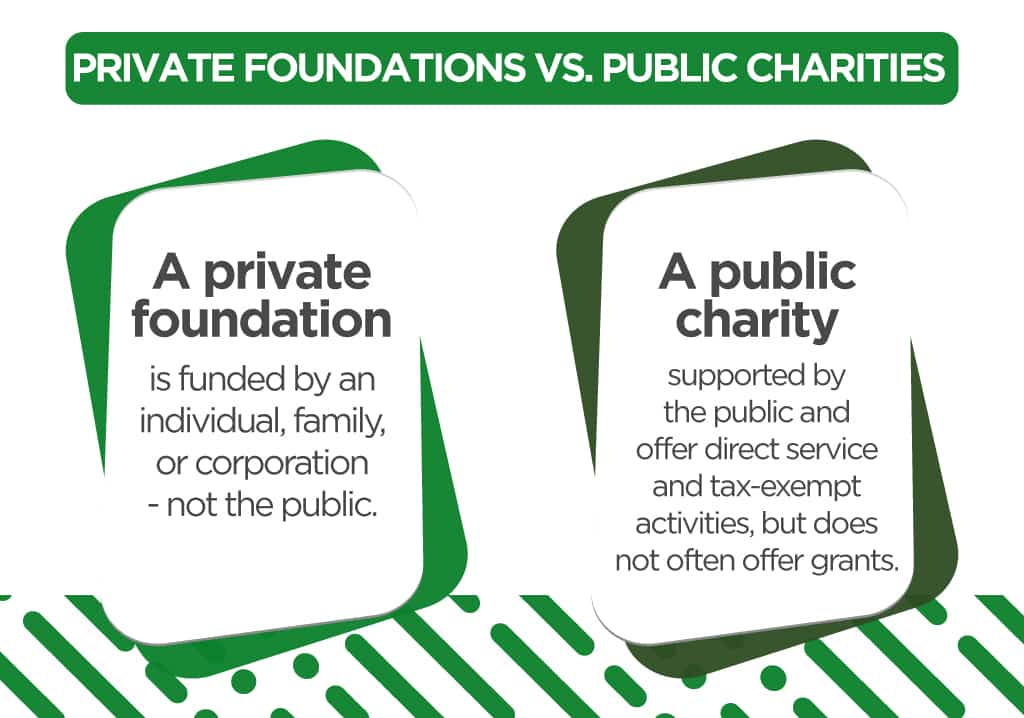
Pros and Cons of Private Farm Grants
You know what a private agricultural grant is - and you know where to look for one.
But the main question remains:
Is pursuing a private grant better than trying to get a public grant or research grant?
Ultimately, the only one that can answer that question is you because you are the only one who really understands the nuances of your situation, but let’s take some time now to discuss the pros and cons of private grants so you can make an informed decision.
Pros:
- One of the main advantages of private grants is the limited amount of regulation of awards for grant recipients. For example, the same level of reporting on how the grant money is used and how effective it is may not be required.
- The qualification process tends to be simple. For example, a private grant may not require a lengthy proposal to receive grant money, unlike public grants, which may require an in-depth explanation of how you plan to use the funds.
- Fewer applicants are in the proposal pool, which means you have a higher chance of being chosen.
- More rapid turnaround of the award. Many private organizations have a set schedule of proposal reviews and presenting awards. With fewer levels of review, awards may be made more rapidly.
Of course, private grants also have drawbacks. Here are a few things to consider before applying for a private grant:
Cons:
- Awards are often smaller and less likely to cover all project costs, and many don’t cover indirect costs.
- Because private grant institutions are not held accountable for their actions by voters and other legislatures, applicants and grant recipients may face problems with project support, rejection, and getting their voices heard.
- Unless the foundation is big, there may be less support for questions, and fewer opportunities for personal contact.
Here’s the bottom line:
If you are looking for a smaller grant with less red tape, and a higher chance of getting the grant, a private grant could be for you.
However, if you are searching for a large grant, and need plenty of support along the way, you may want to pursue a public grant.

Private Agricultural Grant Opportunities
Let’s get practical.
If you want to pursue a private agricultural grant, which organizations should you start with?
Here are a few to get you started. Check them out and choose the one that is the best fit for you!
Food Animal Concerns Trust (FACT) awards grants for projects that help family farmers transition to pasture-based systems, improve the marketing of their humane products or more generally enrich the conditions in which the farm animals are raised.
2 - Organic Farming Research Foundation
This non-profit foundation sponsors research, including farmer-directed research related to organic farming practices. Proposals are considered twice a year in May and November.
3 - Foundation for Food & Agriculture Research
This organization funds pioneering research and invests in the scientific workforce in many areas like soil health, sustainable water management, next-generation crops, advanced animal systems, and urban food systems.
4 - Barnraiser
The crowd-funding website Barnraiser supports projects related to sustainable food and farming. With a 70% project success rate, Barnraiser is helping farmers raise money to purchase items such as a walking tractor, new fencing, poultry processing equipment, or a wood-fired oven.
5 - Chipotle Cultivate Foundation
The Chipotle Cultivate Foundation’s grant-making focuses on supporting family farms that are committed to sustainable farming practices; organizations that are working to develop an affordable, sustainable, pasture-based system of animal production; and organizations promoting better food through innovation or education.
This organization provides grants (up to $5,000) to small farms and NPOs for sustainability projects that have a positive impact on the environment, local food systems, and farm diversity.
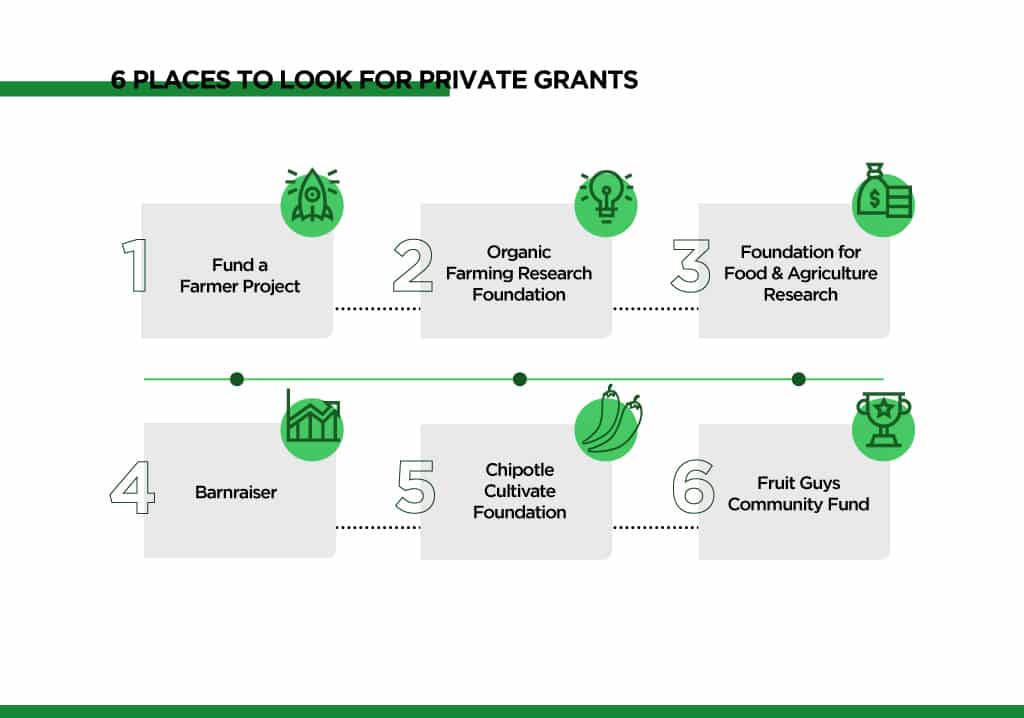
Public Agricultural Grants
If you read over the section on private grants and are looking for something different, this is the time to pay close attention.
Let's start at the beginning and make sure we’re on the same page about public agricultural grants.
What Is A Public Agricultural Grant?
We said that a private grant is “any grant that comes from an entity that is not tax supported.”
Logically, public grants are pretty much the opposite of private grants.
So, in broad terms, a public grant is simply a tax-supported grant. In other words, public funding comes from a federal, state, or publicly funded agency.

Pros and Cons of Public Agricultural Grants
Should you pursue a public grant?
Let’s take a look at both the pros and cons so you can move forward with confidence:
Pros:
- Federal agencies tend to have more funds available.
- Funds are available for a wide range of organizations.
- More likely to pay “all” project costs and/or cover indirect costs.
- Support during concept development and proposal design is easily available
- You know the possibilities of renewal up front.
- Application processes and deadlines are public and very firm.
- “Common” application forms and prescribed formats to decrease re-learning appropriate content and form.
- Plentiful staff resources - most projects have a specific contact person.
Federal funding requests, of course, also have their drawbacks. Sometimes, the advantages of consistency and structure can backfire and create crisis situations of limited review prior to submission.
Before you decide to seek federal funding, also consider:
Cons:
- Lengthy proposal requirements and complex application, administration, and compliance processes. For example, an application submitted five minutes past an 11:59 p.m. deadline might not be accepted due to the grant's rules.
- Often required institutional cost-sharing. This is becoming less of a federal issue but still arises frequently with state and other public agencies.
- Reviewers may tend to favor established applicants
- Difficulty in proposing new or high-risk approaches to a problem
- Cost to the institution may be higher due to the complexity of applications and stricter compliance requirements
- Funding of public grants is subject to the ebb and flow of the political tide. The next party in office may choose to cut the resources for a particular grant.
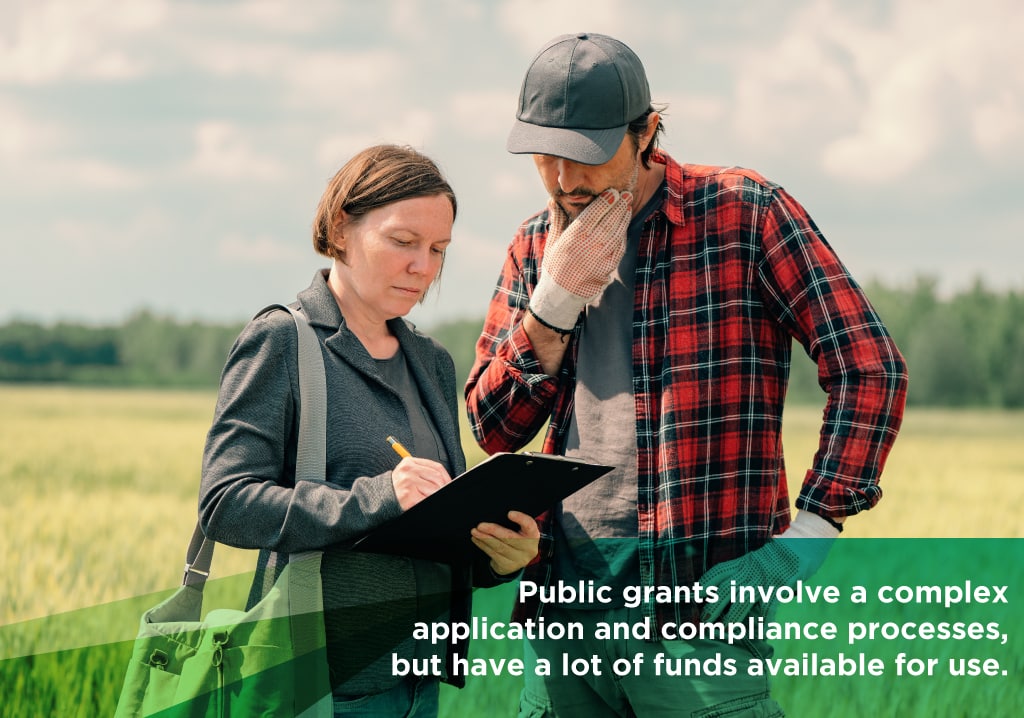
Where To Start With Public Agricultural Grants
Public grants can be flat-out intimidating. The thought of all the red tape and bureaucratic headaches causes some farmers to miss out on excellent grant opportunities.
The key is to keep it simple.
As the old saying goes, “Inch by inch it's a cinch, yard by yard it's hard!”
That’s why we want to give you a few simple steps to get started with public grants. This is not an exhaustive guide to everything you need to know to apply for a government grant - but it is a way to get you started with the process.
There are three main things to do to get started
- Check With Local Resources
Have you ever faced a problem that you just can’t solve? You can read online articles to try to troubleshoot your issue until you are blue in the face, but sometimes you just need to talk to an expert in that field.
It ends up saving you valuable time, stress, and money.
That’s why we highly suggest checking with your local resources first when looking for a public agricultural grant.
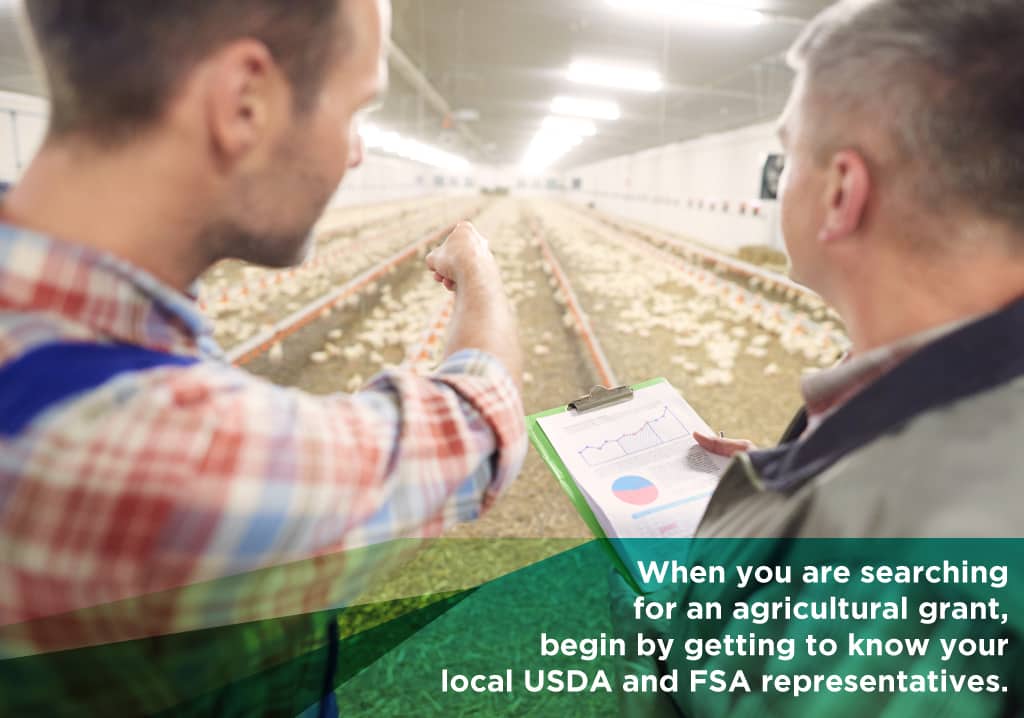
Begin by visiting your local USDA Service Center or local FSA office. To do so, simply google “local USDA center” or “local FSA office.” The options nearest to you should pop right up.
Then you can get to know your local USDA or FSA representative. They can give you treasure troves of advice on which grants are available to you, and where you can go to get started on applying. Beyond that, developing a relationship with them means that they are available to answer other questions you have along the way.
If you’re a brand new farmer, don’t worry.
These people’s jobs are to help people just like you. They won’t look down their nose at you no matter what your experience level is, and they can lend a very helpful hand in getting a government agricultural grant.
- Get in Touch With A Farmer Coordinator
Beginning Farmer and Rancher Coordinators are USDA team members that can help you understand the USDA process and find the right assistance for your operation.
There is a coordinator for each state. Just check out the link above, find your state, and give the coordinator a call.
- Register at grants.gov
If you want to do things on your own, start by registering at grants.gov - even if you aren’t quite ready to apply for a grant.
Grants.gov is like a catalog of grants that are available. It even shows grants that have already passed. This is valuable because public grants that are currently closed are likely to reopen in 10-12 months.
So, if a grant catches your eye that is currently closed, keep tabs on it - it’s likely to open again.
While these three steps won’t finish your grant application from start to finish, they might help you kick off the process.
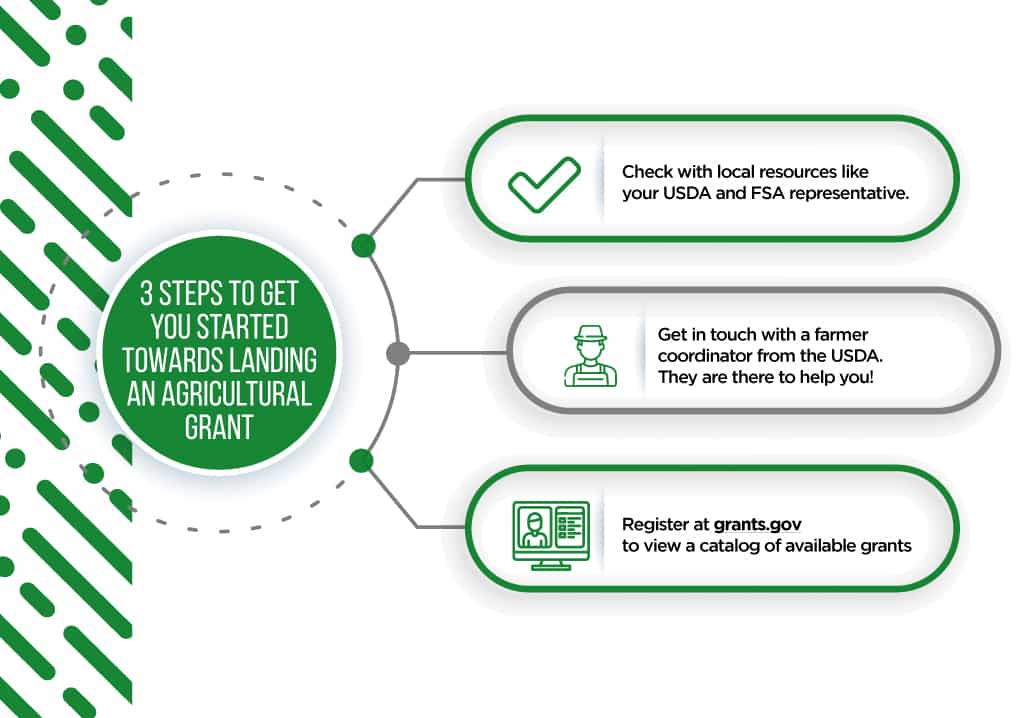
Public Agricultural Grant Opportunities
If you are looking for federal organizations that offer agricultural grants, there are lots of places you could start. Here are 10 places you could try:
- The U.S. Department of Agriculture is the broad, overarching place to start. Technically, subsets of the USDA are the organizations that offer loans.
- USDA’s Farm Service Agency
- Farmers.gov from USDA
- National Resources Conservation Service (NCRS)
- National Institute of Food and Agriculture (NIFA) offers research grants through its Beginning Farmer and Rancher Development Program.
- National Center For Appropriate Technology (NCAT)
- ATTRA is a division of NCAT that focuses on sustainable agriculture.
- EQIP (Environmental Quality Incentives Program)
- CSP (Conservation Stewardship Program)
- EDA (Economic Development Administration)
Most State Departments of Agriculture run grant programs as well. Contact your Department of Agriculture to see what programs they offer or visit the National Council of State Agricultural Finance Programs.
Research Agricultural Grants
The last type of grant we will look at is a research grant. Again, it’s best to start at the beginning and make sure we are defining our terms in the same way.
What Is A Research Grant?
Grants for research are normally funded either by large corporations or through government funding. Many state colleges also offer research grants for projects they are working on.
So, how does a research grant work?
Typically, the grantor requests research to solve a problem, or to measure outcomes through comparative analysis and offers a research grant to have this information provided.
In other words, you get a grant to conduct research. If the research falls within the scope of what you are doing on your farm or ranch, it could be a perfect fit.
For example, someone may want to test the hypothesis that moving chicken coops every day, and allowing hens to forage regularly creates healthier eggs, better soil, and more profitable farms.
If you were already interested in experimenting with pastured poultry, this would be a perfect opportunity!
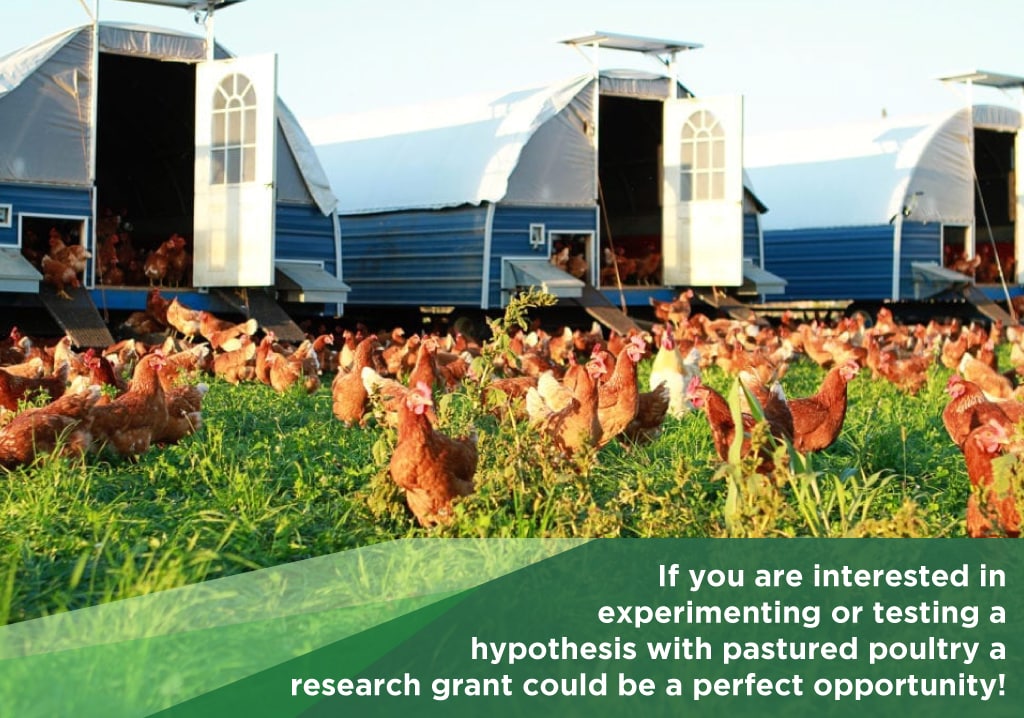
Pros and Cons Of Research Grants
Research grants are very similar to public grants. For a list of pros and cons, you can refer to the public grant portion of this article.
For now, the important thing to know is this:
Because research grants are testing a specific hypothesis, extensive reporting is required for your grant. The grantor will definitely want to know what you are doing with the money that was given to you, and if the operation is successful.
And while getting a grant is exciting, remember that it is a legal contract.
Especially in research grants, you may only receive money as you meet milestones in the project. Or, you may have the grant rescinded if reporting is not met.
Getting Started With Research Grants
If you are interested in a research grant, a great place to start is Sustainable Agriculture Research and Education (SARE) - sponsored by the USDA.
To learn about grant opportunities from SARE, visit your regional site.
It’s also a good idea to contact your State Department of Agriculture to see which opportunities may be available at a state level.
Conclusion
Farmers need money--but sometimes money is hard to come by.
Thankfully, it doesn’t have to be that way. With the proper knowledge, resources, and contacts you can pursue a grant and get money to grow your farm.
At The Mobile Chicken House, our mobile coops have been utilized by grant winners to create sustainable farms. Plus. we offer many different styles and sizes of coops to meet your needs:
- Mobile coop that houses 300 chickens
- Mobile coop that houses 650 chickens
- Mobile range coop for 250 chickens
- Mobile range coop for 600 chickens
Our coops are solar powered, have automatic lights, nests, and food and water systems, and a custom egg gathering system. Plus they give hens true access to fresh pasture every single day.
The results are amazing: happy, healthy birds, higher egg production, lower labor costs, and healthier soil.
And the best part? Working with us is easy. All you have to do is:
- Get a quote: Select the options you want and receive your custom quote.
- Place an order: Schedule your down payment and reserve your mobile chicken house
- Experience the difference!
Check out all our chicken house features and get a quote today. We look forward to hearing from you!
